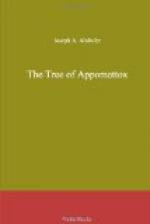All three of the young men took it as prophetic and when John Watson started north they waved him a friendly farewell. Another long wait followed, while the iron winter, one of the fiercest in the memory of man, still gripped both North and South. But late in February there was a great bustle, portending movement. Supplies were gathered, horses were examined critically, men looked to their arms and ammunition, and the talk was all of high anticipation. An electric thrill ran through the men. They had tasted deep of victory since the previous summer, and they were eager to ride to new triumphs.
“It’s to be an affair of cavalry altogether,” said Warner, who obtained the first definite news. “We’re to go toward Staunton, where Early and his remnants have been hanging out, and clean ’em up. Although it’s to be done by cavalry alone, as I told you, it’ll be the finest cavalry you ever saw.”
And when Sheridan gathered his horsemen for the march Warner’s words came true. Ten thousand Union men, all hardy troopers now, were in the saddle, and the great Sheridan led them. The eyes of Little Phil glinted as he looked upon his matchless command, bold youths who had learned in the long hard training of war itself, to be the equals of Stuart’s own famous riders. And the eyes of Sheridan glinted again when they passed over the Winchesters, the peerless regiment, the bravest of the brave, with the colonel and the three youthful captains in their proper places.
The weather was extremely cold, but they were prepared for it, and when they swung up the valley, and forty thousand hoofs beat on the hard road, giving back a sound like thunder, their pulses leaped, and they took with delight deep draughts of the keen frosty air.
While they carried food for the entire march, the rest of their equipment was light, four cannon, ammunition wagons, some ambulances and pontoon boats. Dick thought they would make fast time, but fortune for awhile was against them. The very morning the great column started the weather rapidly turned warmer, and then a heavy rain began to fall. The hard road upon which the forty thousand hoofs had beat their marching song turned to mud, and forty thousand hoofs made a new sound, as they sank deep in it, and were then pulled out again.
“If it keeps us from going fast,” said the philosophical sergeant, “it’ll keep them that we’re goin’ after from gettin’ away. We’re as good mud horses as they are.”
“Do you think we’ll go through to Staunton?” asked Dick of Warner.
“I’ve heard that we will, and that we’ll go on and take Lynchburg too. Then we’re to curve about and in North Carolina join Sherman who has smashed the Confederacy in the west.”
“I don’t like the North Carolina part,” said Dick. “I hope we’ll go to Grant and march with him on Richmond, because that’s where the death blow will be dealt, if it’s dealt at all.”




